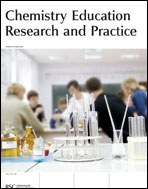SHOULD CHEMISTRY LESSONS BE MORE INTELLECTUALLY CHALLENGING?
Abstract
Empirical studies on students' alternative conceptions have shown that students often make mistakes as they are misled by alternative conceptions, for instance when they are not aware of the shift of meaning which some chemical terms have undergone in the course of time. Such terms are ambiguous since they contain an old and a new aspect. Oxidation has shifted from an oxygen transfer to an electron transfer reaction. Neutralization was defined as a reaction between an acid and a base which consume each other; nowadays it is seen as a proton transfer reaction producing water. A chemical reaction was seen as proceeding in one direction, while in principle all chemical reactions reach equilibrium as a result of a forward and a reverse reaction. The periodic table has developed from a table of elements as substances to a periodic table of atoms of the elements. To solve problems in these areas proved to be quite a challenge for many students. Some arrived at correct answers, others did not. However, the majority tried to find reasonable solutions. To make chemistry lessons more attractive needs more intellectually demanding courses and a new teaching culture in which teachers are interested in what students think and from that basis help them to develop their understanding of chemistry. [Chem. Educ. Res. Pract. Eur.: 2000, 1, 17-26]

 Please wait while we load your content...
Please wait while we load your content...